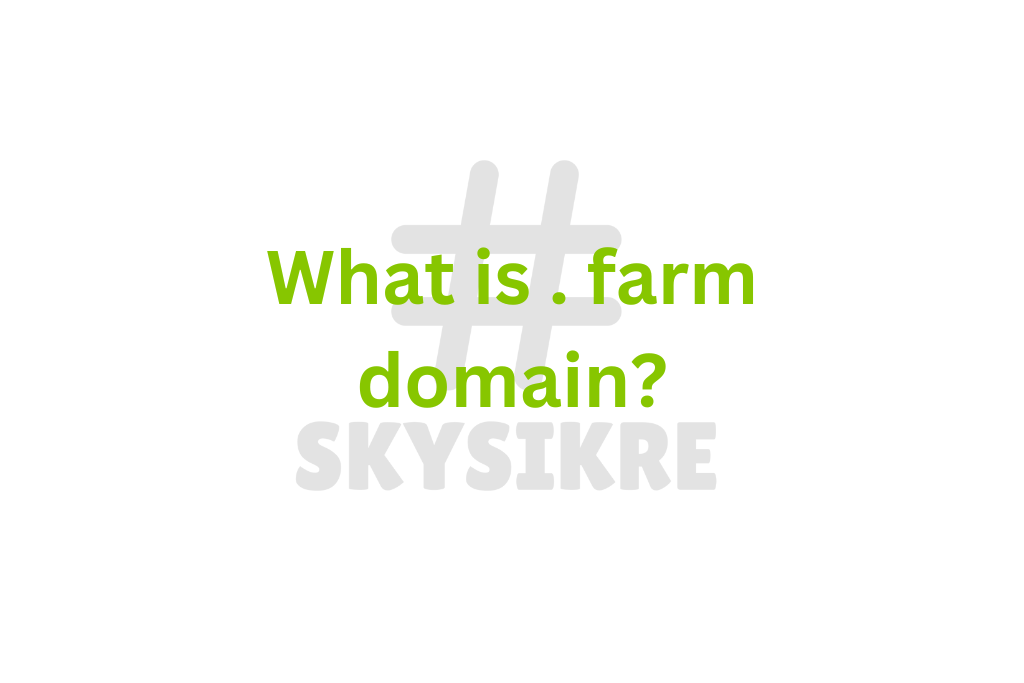Introduction to .farm Domains
The .farm domain is a specific type of generic top-level domain (gTLD) that was introduced to cater to the needs of individuals and businesses involved in agriculture and related industries. This domain extension serves as a digital identity, allowing farmers, agricultural organizations, and businesses in the food production sector to establish a more relevant online presence. With the growth of the internet and the diversification of available domain names, the introduction of .farm domains provides an important means for stakeholders in the agricultural sector to connect and communicate their services effectively.
As a gTLD, .farm domains fall under a broader category of domain extensions that have been created to address specific industries and interests. This particular domain name extension plays a significant role in helping users create an online identity that is not only relevant but also easy to remember for their target audience. By utilizing a .farm domain, businesses in the agricultural field can signal their focus and expertise within agriculture, quickly informing visitors about the nature of their services or products.
One of the main advantages of a .farm domain is its ability to enhance search engine visibility. When individuals or entities search online for farming-related services, websites featuring the .farm domain are more likely to appear in relevant search results. Additionally, this unique domain extension fosters a sense of community and trust among users by clearly delineating the focus on agriculture. As such, securing a .farm domain can be a strategic decision for businesses aiming to bolster their online presence and establish themselves as credible players in the agricultural sector.
The Importance of Domain Names
Domain names serve as the digital address of a business or organization, making them an essential component of any online strategy. A domain name is not merely a technical requirement; it plays a critical role in branding and online visibility. The importance of choosing a domain name that accurately reflects the nature of a business cannot be overstated. A well-selected name can instantly convey the brand’s identity and values, while a poorly chosen name may confuse potential customers and detract from the business’s credibility.
Moreover, a relevant domain name can significantly improve search engine optimization (SEO) efforts. Search engines prioritize domain names that contain keywords reflecting the site’s content. For instance, using a .farm domain can enhance the visibility of agricultural businesses, making it easier for potential customers to find specific services related to farming and agriculture. In this respect, the .farm domain not only communicates the business focus but also strengthens SEO strategies, thus increasing the likelihood of appearing prominently in search results.
Furthermore, a well-chosen domain name fosters credibility and trustworthiness. Businesses with professional domain names typically appear more legitimate to consumers. An email address linked to a company’s domain, such as [email protected], enhances professionalism and reassurance for potential clients compared to a generic email address. This is particularly pertinent for businesses in niche markets, such as agriculture or organic farming, where establishing trust is crucial for customer retention and growth.
In conclusion, the importance of domain names transcends mere online presence. They are pivotal for branding, enhancing SEO, and building credibility in the digital marketplace. Choosing a suitable domain, such as a .farm domain for agricultural enterprises, can yield significant advantages in visibility and customer engagement.
Who Should Use a .farm Domain?
In the contemporary digital landscape, a plethora of domain extensions are available, each serving a distinctive purpose. The .farm domain stands out as an ideal choice for those directly involved in agriculture and related industries. This specialized domain provides an online identity that aligns closely with the needs and interests of farmers, agricultural businesses, and organizations. By adopting a .farm domain, these entities can effectively communicate their commitment to the agricultural sector and enhance their visibility on the internet.
Farmers, as the primary stakeholders in agriculture, can benefit immensely from a .farm domain. This domain extension not only helps them to distinguish their online presence but also conveys a strong message about their operations. For instance, a dairy farmer can establish a website that specifically caters to potential customers, educating them about products, practices, and sustainability efforts. Similarly, specialized agricultural businesses, including equipment manufacturers and seed suppliers, can leverage a .farm domain to attract a niche audience that is keen on innovations and developments in the farming sector.
Moreover, agricultural organizations and cooperatives may find a .farm domain particularly useful in unifying their communication efforts. This domain allows them to create websites that serve as resources for members and the community alike. For food producers, from organic vegetable growers to local artisanal cheese makers, a .farm domain provides a platform to promote their products, share their stories, and engage with consumers who value farm-to-table initiatives. Agribusinesses, which often bridge the gap between producers and consumers, can also utilize a .farm domain to present their services and expertise in a professional manner.
In summary, the .farm domain is a fitting choice for anyone engaged in the agriculture sector, offering a unique online identity that helps to connect with audiences effectively while promoting their offerings in a dedicated space.
Benefits of Choosing a .farm Domain
Choosing a .farm domain provides numerous advantages, particularly for businesses and organizations involved in agriculture. One of the primary benefits is the enhancement of branding opportunities. By selecting a .farm domain, businesses can establish a clear identity that reflects their commitment to farming. This specificity allows for a targeted branding strategy that resonates with consumers who are interested in agricultural products and services. A .farm domain is not only memorable but also communicates a sense of expertise and professionalism.
Another significant advantage of a .farm domain is the improvement of search engine relevance. Search engines prioritize keywords in domain names, which means that having a domain ending in .farm can lead to more relevant search results for users. This is particularly advantageous for businesses focused on farming, as it increases the likelihood of attracting an audience genuinely interested in agricultural topics. Therefore, having a .farm domain can aid in achieving higher visibility in search results, ultimately driving traffic to the website.
Furthermore, utilizing a .farm domain fosters greater trust among consumers. In an era where authenticity and specialization are highly valued, a .farm domain signals to potential customers that a business is dedicated to the agricultural sector. This trust can enhance customer loyalty, as consumers often prefer to engage with brands that exhibit clarity in their mission and focus. In a crowded marketplace where many businesses might offer similar products or services, a .farm domain can be a strategic differentiator that not only attracts attention but also cultivates a loyal customer base.
How to Register a .farm Domain
Registering a .farm domain is a straightforward process that enables individuals and businesses in the agricultural sector to establish a distinctive online presence. The first step is to select an accredited domain registrar. Many reputable registrars offer .farm domains, including established companies like GoDaddy, Namecheap, and Google Domains. When choosing a registrar, it is essential to consider factors such as pricing, customer support, and additional services offered, such as website hosting or email accounts.
Once a registrar is selected, the next step involves checking the availability of the desired .farm domain name. Most registrars provide an efficient search tool that allows you to enter your desired domain name to see if it is currently registered. If the domain name you want is available, you can proceed; however, if it is already taken, consider variations or synonyms that reflect your business’s mission and goals. The uniqueness of a domain name can contribute significantly to brand identity.
After confirming availability, initiating the registration process is the next crucial step. This typically involves filling out a registration form with details including the domain name, your personal information, and payment information. Be sure to review any registration terms, as they may vary between registrars. Once you complete the registration, your .farm domain will be yours, generally for a period of one year.
Finally, keep in mind that .farm domain registrations require annual renewals. It is important to set reminders for renewal to avoid losing your domain name. Most registrars offer auto-renew options which can simplify this process. Choosing the right .farm domain is vital for your online branding, so select a name that aligns with your agricultural objectives, ensuring it resonates well with your target audience.
SEO Considerations for .farm Domains
When it comes to online visibility, choosing a suitable domain extension, such as .farm, plays a significant role in search engine optimization (SEO). A .farm domain is particularly beneficial for businesses and organizations involved in the agriculture sector, as it clearly signals to both users and search engines what the website is about. This geographical and industry specificity can help target a dedicated audience that seeks information, products, or services related to farming.
Incorporating relevant keywords related to agriculture within the content on a .farm domain is essential. This means that website owners should focus on terms and phrases that their target audience is likely to search for, such as “organic farming,” “sustainable agriculture,” or “farm equipment.” By integrating these keywords naturally into the website’s text, titles, and meta descriptions, businesses can improve their chances of ranking higher in search results. Additionally, creating content that addresses common questions and concerns in the farming community can further enhance the site’s visibility.
Another key aspect of SEO for .farm domains is the importance of linking. Obtaining backlinks from reputable websites in the agriculture industry can significantly affect search rankings. Strategies might include guest blogging, collaborating with agricultural influencers, or participating in relevant online forums. Moreover, leveraging social media platforms to promote content and create engagement can also drive traffic to the website and improve domain authority. Sharing valuable content, such as tips for farmers or insights on agricultural trends, can encourage shares and interactions, which ultimately benefits SEO.
In summary, by focusing on relevant keywords and employing strategic linking and social media efforts, businesses using a .farm domain can significantly enhance their search engine visibility, connect with their target audience, and bolster their online presence within the agricultural sector.
Case Studies: Successful .farm Websites
The adoption of the .farm domain has proven to be beneficial for a variety of businesses and organizations, enhancing their online presence and facilitating effective customer engagement. One notable case study is that of GreenThumbs.farm, a small urban farming initiative that has utilized this domain to distinguish itself from traditional gardening competitors. By adopting the .farm domain, GreenThumbs.farm effectively communicated its specific focus on urban agriculture, which has drawn the attention of environmentally conscious consumers in their local area. This strategic choice has contributed significantly to their marketing strategies, allowing them to enhance their brand image and engage with their target audience through dedicated online content.
Another compelling example is HeritageFarmProducts.farm, a co-op specializing in organic produce. By employing the .farm domain, HeritageFarmProducts.farm successfully established a digital identity that conveys trust and authenticity. The website serves as a platform for storytelling, where they share the journey of their products from seed to table. This transparency has led to increased customer loyalty and has effectively captured the interest of health-minded consumers. The integration of e-commerce functionalities further boosted their customer engagement, showcasing how the .farm domain can be leveraged for business growth and direct sales.
Lastly, we can examine PetalPushers.farm, a flower and plant delivery service that opted for the .farm domain to enhance its branding. This decision allowed PetalPushers.farm to differentiate itself from generic floral services, creating a more niche appeal that resonates with customers looking for unique and locally sourced products. By focusing on their online presence through engaging content, social media marketing, and community collaboration, PetalPushers.farm has seen a marked increase in website traffic and sales. Each of these case studies illustrates the significant advantages that the .farm domain can offer to businesses seeking to cultivate a strong online identity and achieve their marketing goals.
Future of .farm Domains
The future of .farm domains appears promising, particularly as the agricultural sector undergoes significant transformation driven by technology and innovative practices. These niche domains are becoming increasingly relevant as more farmers, agribusinesses, and agricultural organizations recognize the necessity of a distinctive online identity. From local farmers promoting their produce to larger agritech companies showcasing cutting-edge solutions, the .farm domain serves as a suitable platform for consolidating their online presence.
One major factor influencing the rise of .farm domains is the expansion of agricultural technology. As the integration of technology in farming continues to grow—through precision agriculture, automated machinery, and data analytics—the demand for specialized online spaces will likely increase. The .farm domain provides a unique opportunity for businesses operating within this technological landscape to differentiate themselves in a crowded market. This distinction not only enhances brand visibility but also reinforces the credibility of those associated with agricultural advancements.
Moreover, consumer awareness and preference for purchasing directly from local farmers or producers has surged. E-commerce continues to flourish in the agricultural sector, prompting the necessity for businesses to establish a strong digital footprint. A .farm domain can facilitate this by enabling farmers and agricultural businesses to create user-friendly websites that connect them directly to consumers. As the public increasingly gravitates towards transparency and authenticity in food sourcing, the importance of a dedicated online platform cannot be overstated.
In conclusion, the future of .farm domains is poised for growth, propelled by the increasing relevance of niche domains in the agricultural industry, the rise of technological innovations, and the ongoing need for effective online branding. These factors will contribute to a vibrant digital landscape for farming entities, enabling them to thrive in an evolving marketplace.
Conclusion
In summary, the .farm domain represents an essential tool for individuals and organizations involved in the agricultural sector. This specialized domain extension fosters a unique online identity that distinguishes farming ventures from others. With the agriculture industry continually evolving, leveraging a .farm domain can greatly benefit businesses, farmers, and agriculturally-focused communities by providing them with a recognizable and relevant web address.
One of the primary advantages of adopting a .farm domain is its ability to enhance visibility and credibility. A .farm URL signals to users that the website is dedicated to farming-related content, creating an instant connection with the target audience. This can lead to increased traffic and engagement, as potential clients, customers, and collaborators can easily identify the nature of the business or service being offered.
Moreover, the .farm domain can be instrumental in branding efforts. By selecting a domain extension that is closely aligned with their industry, businesses can strengthen their brand identity and reinforce their commitment to the agricultural community. Whether a small family farm, a cooperative, or an agribusiness, utilizing a .farm domain can convey professionalism and a focus on the farming sector.
As more agricultural professionals and organizations establish their online presence, it is crucial to consider the strategic advantage that a .farm domain can offer. Not only does it signify a commitment to innovation in the agriculture field, but it also facilitates meaningful connections within the sector. Thus, transitioning to or incorporating a .farm domain can be a vital step for anyone looking to make their mark in the farming industry.






